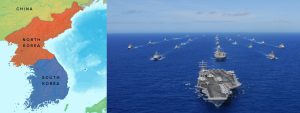China’s State Media Global Times recently published a series of editorials on the North Korea nuclear crisis. Below is an excerpt from one editorial discussing the boundary of Sino-U.S. cooperation on this issue.
“Some of the strategic factors of the DPRK nuclear issue have changed, including that the scope of cooperation between China and the United States is expanding. China has not only strengthened the intensity of sanctions against the DPRK, but also will further strengthen the sanctions if the DPRK takes new important actions that violate the UN Security Council resolution. In addition, the United States has given up its ‘strategic patience’ policy and openly talks about the possibility of launching military attacks against the DPRK. It seems that this is not just a verbal threat.”
“China and the United States seem to have made a determination to become more active on the DPRK nuclear issue. The possibility of a DPRK nuclear issue is declining sharply. Pyongyang faces a strategic choice between confrontation to the end at the risk of survival and coming back to the negotiation table by abandoning its nuclear program.”
“Cooperation between Beijing and Washington will not be without principles. Beijing will insist on limiting Sino-U.S. cooperation to the goal of restraining North Korea’s nuclear-led activities. However, with the development of the situation, it is estimated that Beijing will agree to resort to the severe means of bringing down North Korea’s entire economic activities, such as stopping the majority of oil exports to the DPRK. If the United States implements the financial blockade, Beijing will also likely agree to cooperate.”
“In any case, Sino-U.S. cooperation will not be extended to the military threat to the DPRK. Beijing will never support or cooperate with the United States in taking military action against the DPRK; it will not support the United States in “expanding” its goal of overthrowing the Pyongyang regime.”
Source: Global Times (Huánqiú ) April 18, 2017
http://mil.huanqiu.com/strategysituation/2017-04/10493109.html

